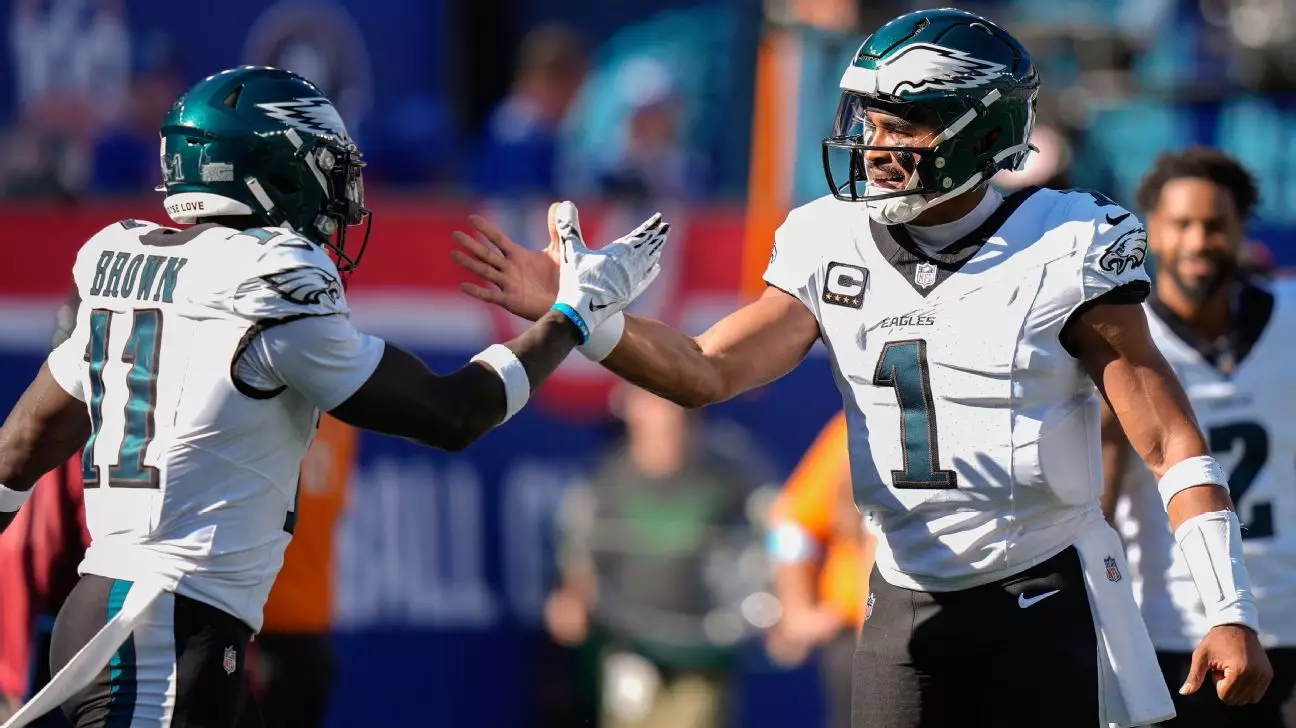In the high-stakes world of the NFL, where every game can determine the trajectory of a season, relationships between players, especially key offensive figures, carry immense weight. Recently, Philadelphia Eagles quarterback Jalen Hurts and star receiver A.J. Brown found themselves under the spotlight when misinformation about their relationship surfaced. A comment made by teammate Brandon Graham sparked speculation, raising concerns among fans and analysts alike. However, both Hurts and Brown took the opportunity to clarify that their bond remains intact amidst the scrutiny, highlighting a deeper narrative about team dynamics, communication, and the inherent pressures of professional football.
The controversy erupted following the Eagles’ gritty 22-16 victory over the Carolina Panthers, their ninth straight win. While the outcome was positive, the performance of the passing game left much to be desired. Hurts’ statistics (14 completions on 21 attempts for 108 yards, alongside two touchdowns) belied the promise of a high-flying offense that fans have come to expect. Meanwhile, Brown’s sidelined frustration—evidenced by slamming his helmet—along with his terse response regarding improvements needed in the passing game, inadvertently led to a narrative of interpersonal conflict. Such tensions are not new in sports, where the fusion of personal emotions and public perception often leads to misunderstandings.
Media narratives can often spiral out of control, primarily when athletes are involved. Graham’s comments, made during his radio show, added fuel to the fire, suggesting that the relationship between Hurts and Brown had soured due to the pressures of the season. As he remarked on the inherent challenges of balancing personal and business relationships in sports, it set off a media frenzy. Brown’s response—a’s subsequent insistence that he and Hurts were in a good place—illustrates the disconnect that can occur between reality and public interpretation. The media’s ability to twist words and emotions for a compelling story underscores the need for transparency and clarity within the team’s communications.
Brown offered critical insight into the motivations behind his earlier comments, emphasizing the need for accountability in the passing game. His remarks reflected not only personal ambition but also a desire for the team to rectify the shortcomings that had previously hindered their playoff success. After reaching the Super Bowl in the previous season, the Eagles’ struggles during the current campaign have created an urgency to address flaws proactively. Brown’s focus on improvement is a testament to his competitive spirit and commitment to winning.
As the Eagles strive for consistency, the reliance on a strong ground game featuring running back Saquon Barkley has produced impressive results, leading the league with over 190 rushing yards per game. This shift raises questions about balance in the offense—while a potent rushing attack is vital, the passing game remains a fundamental component of any successful NFL offense. With the Eagles currently holding a commanding 11-2 record and the No. 2 seed in the NFC, the emphasis on attacking all fronts is essential to navigating the playoffs.
Attention now shifts toward the upcoming match against the Pittsburgh Steelers, with the team eager to set aside any distractions. Tackle Jordan Mailata’s assertion that the focus should be directed toward on-field challenges rather than off-field drama encapsulates the urgency that defines the Eagles’ approach. Establishing effective communication and ensuring a unified front in a highly competitive environment is paramount as they aim for the ultimate goal: a Super Bowl victory.
While interpersonal relationships can be fragile in the fast-paced arena of the NFL, the response from Hurts and Brown serves as a powerful reminder that mutual respect and understanding prevail among professionals. As they prepare for their next challenge, it’s clear that the Eagles are determined to channel their energies into improving their performance, while maintaining the integrity of their relationships off the field.

